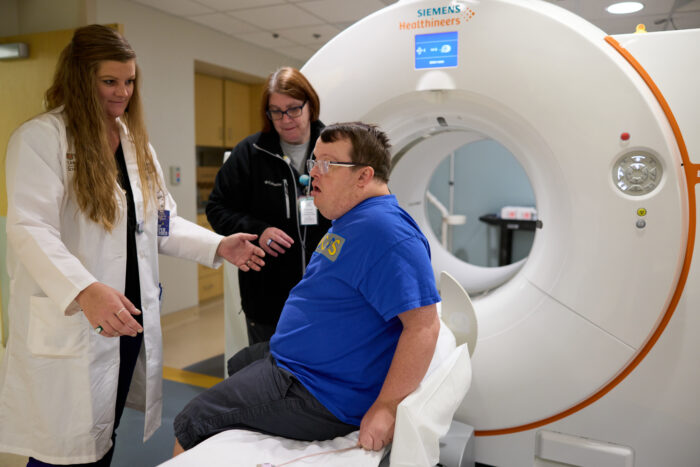- A study shows that nearly all adults with Down syndrome will develop evidence of Alzheimer’s disease by late middle age, with the disease starting earlier and progressing faster in this group.
- The research compared Alzheimer’s development in two genetic forms: autosomal-dominant Alzheimer’s disease and Down syndrome-linked Alzheimer’s, highlighting the need for tailored treatments for those with Down syndrome.
- Currently, no Alzheimer’s therapies are available for people with Down syndrome, highlighting a gap in clinical trials and the urgent need for more inclusive research.
Nearly all adults with Down syndrome will develop evidence of Alzheimer’s disease by late middle age. A new study by researchers at Washington University School of Medicine in St. Louis shows that the disease both starts earlier and moves faster in people with Down syndrome, a finding that may have important implications for the treatment and care of this vulnerable group of patients.
The findings were part of a study, available online in Lancet Neurology, comparing how Alzheimer’s develops and progresses in two genetic forms of the disease: a familial form known as autosomal-dominant Alzheimer’s disease, and Down syndrome-linked Alzheimer’s.
Currently, no Alzheimer’s therapies are available for people with Down syndrome. Beau Ances, MD, PhD, co-senior author and the Daniel J. Brennan Professor of Neurology, emphasized the exclusion of people with Down syndrome from Alzheimer’s clinical trials, calling it a tragedy as these individuals need therapies as much as anyone.
Down syndrome is caused by the presence of an extra chromosome 21, carrying a copy of the APP (amyloid precursor protein) gene. This results in people with Down syndrome producing far more amyloid deposits in their brains than typical individuals, leading to cognitive decline often by their 50s.
People with autosomal dominant Alzheimer’s disease, who inherit mutations in specific genes, also have a predictable timeline to cognitive decline, typically in their 50s, 40s, or even 30s. Unlike most Alzheimer’s patients, who are over 65, these two populations do not show age-associated changes, providing a unique opportunity to understand disease pathology.
The study mapped the development of tau tangles, the second step in Alzheimer’s development, using brain scans from participants with Down syndrome and autosomal dominant Alzheimer’s. It revealed that amyloid plaques and tau tangles accumulate earlier and more quickly in people with Down syndrome, with greater tau levels for a given level of amyloid, suggesting a faster disease progression.
With the amyloid and tau buildup happening nearly simultaneously in Down syndrome-associated Alzheimer’s, targeting both amyloid and tau may be necessary for treatment. While there is currently only one FDA-approved treatment targeting amyloid, therapies targeting tau are also under development for later stages of the disease.
This study is part of a collaboration between the Dominantly Inherited Alzheimer Network (DIAN) and the national Alzheimer’s Biomarker Consortium-Down Syndrome (ABC-DS). The research aims to build a detailed understanding of Alzheimer’s pathology that could lead to better diagnostics and therapies for all forms of the disease.
Research shows that Alzheimer’s disease progresses faster in people with Down syndrome due to unique genetic factors. This finding underscores the need for targeted therapies for this population, highlighting the importance of including individuals with Down syndrome in Alzheimer’s clinical trials.
Tags: down syndrome symptoms, is alzheimer’s genetic, symptoms of down syndrome, donanemab, how common is alzheimer’s, alzheimers medicine, down syndrome and alzheimer’s Down syndrome • Alzheimer’s disease • Medicine
FAQs
How does Down syndrome affect the development of Alzheimer’s disease?
Down syndrome, caused by an extra chromosome 21, leads to increased amyloid deposits in the brain, accelerating Alzheimer’s progression.
What is the significance of the study’s findings for Alzheimer’s research?
The study provides insights into the early and rapid progression of Alzheimer’s in Down syndrome, informing potential treatment strategies.
Are there specific therapies available for Alzheimer’s in people with Down syndrome?
Currently, there are no approved therapies for Alzheimer’s in people with Down syndrome, highlighting the need for targeted treatments.
How do the study’s findings contribute to our understanding of Alzheimer’s disease?
The study helps separate the effects of Alzheimer’s from normal aging, offering a unique perspective on disease pathology.
What are the study’s implications for future Alzheimer’s research and treatment?
The study suggests that targeting both amyloid and tau may be necessary for treating Alzheimer’s in people with Down syndrome, potentially influencing future treatment approaches.
How can the inclusion of individuals with Down syndrome in clinical trials benefit Alzheimer’s research?
Including individuals with Down syndrome in clinical trials can help develop more effective therapies and improve our understanding of Alzheimer’s disease progression.







